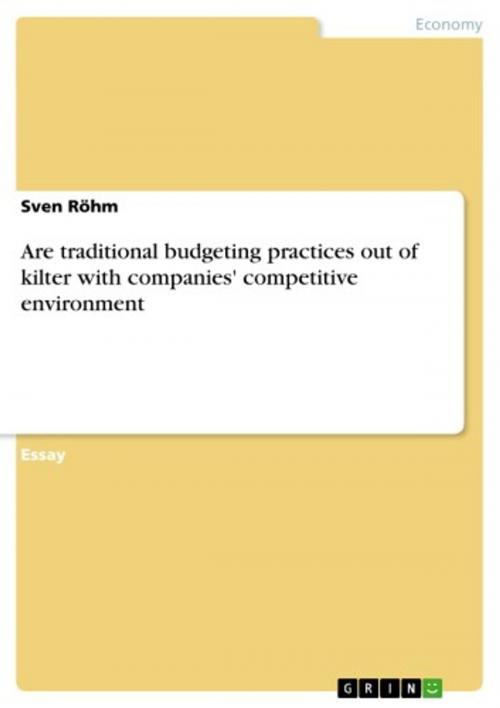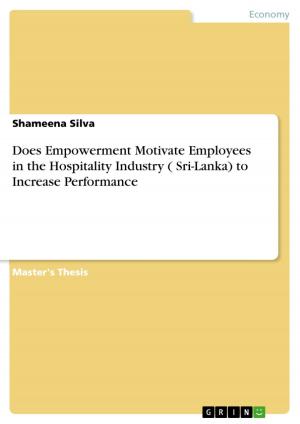Are traditional budgeting practices out of kilter with companies' competitive environment
Business & Finance, Accounting, Financial| Author: | Sven Röhm | ISBN: | 9783638273312 |
| Publisher: | GRIN Publishing | Publication: | May 3, 2004 |
| Imprint: | GRIN Publishing | Language: | English |
| Author: | Sven Röhm |
| ISBN: | 9783638273312 |
| Publisher: | GRIN Publishing |
| Publication: | May 3, 2004 |
| Imprint: | GRIN Publishing |
| Language: | English |
Essay from the year 2004 in the subject Business economics - Controlling, grade: 80% äquivalent zu 1,0 (A), University of Teesside (Tesside Business School), course: Managing Financial Resources, language: English, abstract: Hope and Fraser (2002) argue that traditional budgeting is 'out of kilter with [companies'] competitive environment'. Indeed, traditional budgeting has faced harsh criticism in the recent years. Eye-catching titles, e.g. 'The budget - an unnecessary evil' (Wallander, 1999), 'Bye, bye budget - the annual budget is dead' (Gurton, 1999), and 'Take it away' (Hope and Fraser, 1999b) show the 'anti'- traditional budgeting campaign led by some critics. According to Hope and Fraser (1999a), some big European and American companies have dismantled the budget or are about to do so. It seems that the theoretical debate increasingly changes the companies' attitudes towards the traditional budgeting. Especially some Scandinavian companies head for new forms of operational and strategic control means, e.g. balanced scorecards. About 40 per cent of Swedish companies stated in a survey that they already work on changes to the budgeting process (Glader et al., 1996). Above all, rolling forecasts should play a more important role in the future, raising the responsiveness to changing external factors. According to Hope and Fraser (2003) only 20 per cent of organisations change their budget within the fiscal year. This rigidity is not up-to-date to the fast-changing competitive economy. Therefore rolling forecasts could be more effective for observing and controlling short-term changes. This paper will primarily deal with the criticism on traditional budgeting, especially in relation to Hope and Fraser's assertion. Furthermore, this paper examines whether there is an impact of the above noted campaign on economy, and companies increasingly abandon its budgeting systems due to the criticisms.
Essay from the year 2004 in the subject Business economics - Controlling, grade: 80% äquivalent zu 1,0 (A), University of Teesside (Tesside Business School), course: Managing Financial Resources, language: English, abstract: Hope and Fraser (2002) argue that traditional budgeting is 'out of kilter with [companies'] competitive environment'. Indeed, traditional budgeting has faced harsh criticism in the recent years. Eye-catching titles, e.g. 'The budget - an unnecessary evil' (Wallander, 1999), 'Bye, bye budget - the annual budget is dead' (Gurton, 1999), and 'Take it away' (Hope and Fraser, 1999b) show the 'anti'- traditional budgeting campaign led by some critics. According to Hope and Fraser (1999a), some big European and American companies have dismantled the budget or are about to do so. It seems that the theoretical debate increasingly changes the companies' attitudes towards the traditional budgeting. Especially some Scandinavian companies head for new forms of operational and strategic control means, e.g. balanced scorecards. About 40 per cent of Swedish companies stated in a survey that they already work on changes to the budgeting process (Glader et al., 1996). Above all, rolling forecasts should play a more important role in the future, raising the responsiveness to changing external factors. According to Hope and Fraser (2003) only 20 per cent of organisations change their budget within the fiscal year. This rigidity is not up-to-date to the fast-changing competitive economy. Therefore rolling forecasts could be more effective for observing and controlling short-term changes. This paper will primarily deal with the criticism on traditional budgeting, especially in relation to Hope and Fraser's assertion. Furthermore, this paper examines whether there is an impact of the above noted campaign on economy, and companies increasingly abandon its budgeting systems due to the criticisms.















